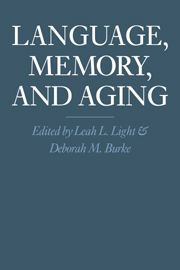Book contents
- Frontmatter
- Contents
- List of contributors
- Preface
- 1 Theories of information processing and theories of aging
- 2 Effects of aging on verbal abilities: Examination of the psychometric literature
- 3 Aging and individual differences in memory for written discourse
- 4 Geriatric psycholinguistics: Syntactic limitations of oral and written language
- 5 Aging and memory activation: The priming of semantic and episodic memories
- 6 Automatic and effortful semantic processes in old age: Experimental and naturalistic approaches
- 7 Integrating information from discourse: Do older adults show deficits?
- 8 Comprehension of pragmatic implications in young and older adults
- 9 Capacity theory and the processing of inferences
- 10 Age differences in memory for texts: Production deficiency or processing limitations?
- 11 Episodic memory and knowledge interactions across adulthood
- 12 The disorder of naming in Alzheimer's disease
- 13 Language and memory processing in senile dementia Alzheimer's type
- 14 Patterns of language and memory in old age
- Author index
- Subject index
7 - Integrating information from discourse: Do older adults show deficits?
Published online by Cambridge University Press: 05 January 2012
- Frontmatter
- Contents
- List of contributors
- Preface
- 1 Theories of information processing and theories of aging
- 2 Effects of aging on verbal abilities: Examination of the psychometric literature
- 3 Aging and individual differences in memory for written discourse
- 4 Geriatric psycholinguistics: Syntactic limitations of oral and written language
- 5 Aging and memory activation: The priming of semantic and episodic memories
- 6 Automatic and effortful semantic processes in old age: Experimental and naturalistic approaches
- 7 Integrating information from discourse: Do older adults show deficits?
- 8 Comprehension of pragmatic implications in young and older adults
- 9 Capacity theory and the processing of inferences
- 10 Age differences in memory for texts: Production deficiency or processing limitations?
- 11 Episodic memory and knowledge interactions across adulthood
- 12 The disorder of naming in Alzheimer's disease
- 13 Language and memory processing in senile dementia Alzheimer's type
- 14 Patterns of language and memory in old age
- Author index
- Subject index
Summary
There are currently two major routes of explanation for age-related deficits in discourse memory. The first, more empirical approach, seeks complex interactions among subject, task, and text characteristics (Hultsch & Dixon, 1984; Meyer, in press; Meyer & Rice, 1983, in press). Meyer and Rice have argued that age differences are heightened when people low in verbal ability are compared, relative to when those high in verbal ability are tested, when narratives rather than expository passages are presented, and when short rather than long texts are studied. In a meta-analysis of the extant literature, we verified that the first two suggested factors – high verbal ability and expository passages – reduced the effect size of age differences in prose recall, but the third did not (Zelinski & Gilewski, in press): Age differences were reliably smaller in studies in which subjects high in verbal ability were tested and in which expository texts were used, but the differences remained highly significant across studies. Thus, the interaction of certain factors with age does account for some variance in discourse recall, but the age differences are not fully explained by this approach.
The second, more theoretically based, class of explanations for age deficits in discourse recall is that there are fundamental differences in how adequately older adults process text information as compared to younger ones. The working-memory capacity deficit model, which is reviewed in the chapters by Hasher and Zacks and by Cohen in this volume, suggests that older adults have insufficient working-memory capacity to process complex relationships among concepts in discourse and that this deficit impairs their language comprehension.
- Type
- Chapter
- Information
- Language, Memory, and Aging , pp. 117 - 132Publisher: Cambridge University PressPrint publication year: 1988
- 14
- Cited by



